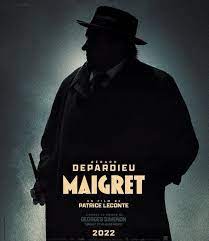MAIGRET
France, 2022, 90 minutes, Colour.
Gerard Depardieu, Jade Lebeste, Melanie Bernier, Aurore Clement, Herve Pierre, Clara Antoons, Pierre Moure, Anne Loiret, Andre Wilms.
Directed by Patrice Leconte.
 All crime fiction fans know who Maigret is. He is up there with Poirot and Miss Marple. But, especially beloved in France, the creation of author Georges Simenon.
All crime fiction fans know who Maigret is. He is up there with Poirot and Miss Marple. But, especially beloved in France, the creation of author Georges Simenon.
Over the decades, there have been film versions of the Maigret crime dramas as well as television series. (The most recent Maigret was, surprisingly, a very subdued and serious Rowan Atkinson.) This time it is another French icon, Gerard Depardieu, even larger than he used to be, an imposing screen presence, in his early 70s. His Maigret seems to be rather world-weary, life-weary, having experienced many disappointments, but committed to his work as police and as a detective.
In many ways, this is a straightforward mystery, investigation, running for just 90 minutes. But, it is well written, opening with the victim, her unexplained behaviour, conflict, her mysterious death, murder. And the screenplay invites us to enter by identifying with Maigret, looking at evidence, noting clues, following them through, step-by-step, nothing spectacular here. Rather, the painstaking and patient detailed work.
The design and colour palette of the film indicate the setting, the drab immediate post-war Paris.
We are introduced to a number of characters, a young woman who resembles the murdered woman, Maigret eventually discovering where she lived, her roommate, leading to a visit to a film set, to a social engagement party, to the young businessman and his protective mother.
It is not that Maigret does it all on his own. He does have two very loyal assistants who do a lot of the footwork and interrogations. There are also discussions with the coroner, with judges.
But, Maigret does live in a rather dark world, at times literally dark or at least shadows. He has a supportive wife who understands him and is patient. He has had to give up his smoking and pipe for health’s sake. And, we realise that his preoccupation with solving the death of the young girl brings him back to the death of his own daughter, aged 20, and visits to her grave.
There is some excitement at the end when Maigret creates a set-up which is meant to startle the killers and get a confession – which it does.
So, if you are a fan of Maigret, Gerard Depardieu offers an interesting interpretation. If you like detective work, then this is quietly thorough. And if you like French cinema, the director, Patrice Leconte, is a long time veteran director (The Hairdresser’s Husband, Moensieur Hire, Ridicule).
- The continued popularity of Inspector Maigret over the decades? The work of Georges Simenon?
- The period setting, the post-World War II period, the touch of the drab, dark and shadows? Costumes and decor? Homes, clubs, wealthy socials, streets and departments? The musical score?
- Audience expectations of Maigret, past performers? The presence of Gerard Depardieu, age, bulk, suits, coats, hats? Giving up the pipe? His age, the touch of the world-weary, life-weary? The visits to the doctor and their advice? The support of his wife? The significance of the death of their daughter so young, his obsessions, investigating?
- The basic situation for investigation, the introduction to Louise, her age, going for the fitting, the dress, the accessories, her drinking at the bar, going to the social, her appearance, the hostile reaction? Her being found dead in the street, stabbed and bleeding?
- Maigret, his quiet methods, following the leads, the development of the case and the leads, his not speculating, just enquiring? Building up his case? No information about the dead girl, following leads, finding her accommodation, some background? Fiddling with her hair? Seeing Betty, the discussions, her misinterpretation, escaping, the later encounter, setting her up in the apartment, the landlady and the cooperation, getting information? The encounter with Jeanine? The follow-through, the acting, going to the studio, more information about Louise, that the film studio?
- The information about the engagement party, Jeanine and deceptions, finding the truth, going to visit the fiance, his mother, his reactions?
- The setting up of Betty, with Jeanine, the fiance and Laura? The sexual experience, Betty’s reaction?
- Maigret, weary, not eating or drinking much, discussions with the doctor, the autopsy, discussions with the judge and his case? Past friends? His two loyal assistants and their doing interrogations? His visit at home, with his wife, her support? The visit to the cemetery?
- The confrontation with the family, setting up Betty to be dressed like Louise, at the party, the reactions? The revelation of the truth? An accident, the family. Warning the police, the mother, her strong mindedness, possessive of her son, the past and her fickle husband, her son’s sexual propensities, her decision to stab the body and leave it in the street, the son calling the police?
- The aftermath, Maigret going to the cinema and seeing the scenes with Louise and her loneliness and isolation? The farewell to Betty going home to her family? And his continuing his work – with a touch of weariness?